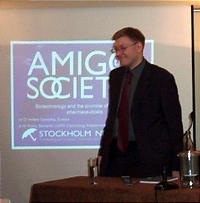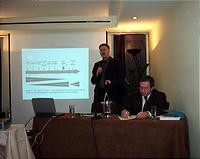February 28, 2006
The Best Prisons Money Can Buy
 Recently I encountered the argument that the huge number of prisoners in the US is due to its capitalist system. Being a pro-market statistics addict I immediately countered by looking up World Prison Brief and comparing with the Heritage Foundation index of economic freedom. There didn't seem to be much correlation when one compared the numbers for the top prison nations or top free market nations. But how does the distribution actually look? I couldn't resist doing a scatterplot, as well as add a bit of a density field in the background (Tufte, forgive me).
Recently I encountered the argument that the huge number of prisoners in the US is due to its capitalist system. Being a pro-market statistics addict I immediately countered by looking up World Prison Brief and comparing with the Heritage Foundation index of economic freedom. There didn't seem to be much correlation when one compared the numbers for the top prison nations or top free market nations. But how does the distribution actually look? I couldn't resist doing a scatterplot, as well as add a bit of a density field in the background (Tufte, forgive me).
The upper right cluster of Russia, Turkmenistan, Belarus, Suriname and Cuba seems to be a remnant of good old-fashioned socialist oppression (although Suriname is more politically free than the others). The lower right group of Libya, Iran, Zimbabwe and Myanmar suggests more traditional despotism.
The US is a really extreme outlier. Singapore and Estonia are the other notably free-market, high prisoner countries. In the case of Estonia 36% of the prison population consists of foreigners, most likely Russians - the high number likely reflects the problematic situation of Russians living in Estonia, perhaps the major human rights problem for the otherwise impeccable Batlic state. I guess nobody would expect "Disneyland with the death penalty" Singapore to be particularly prison-free.
Underneath them is a cluster of open west european countries (and Armenia), much economic freedom, few prisoners. Ireland and Iceland look really good.
The big cluster consists of very diverse countries, from Saudi Arabia to Sierra leone. Here there really seem to be some kind of (rather low) correlation between increasing economic freedom and number of prisoners. Maybe it is all a matter of economics: running prisons is expensive, and the poorest countries cannot afford many prisoners regardless of level of oppression. Hmm, I ought to compare this with the Freedom House political freedom index and maybe GDP too. It is also likely that many of these countries have far more prisoners than they admit. But that doesn't change the overall impression: economic freedom doesn't have much to do with number of prisoners.
Why the US is like it is, I don't know. It can't just be a high Gini coefficient, because then south america would be up there too. That the high GDP enables a large prison industry seems reasonable, but it doesn't explain that the prisons get filled. Clearly the explanation cannot be directly economical but must be based on a social, political and legal analysis.
February 26, 2006
Sculptures of Brussels
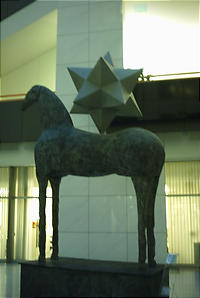 I recently visited Brussels, speaking on pharmacogenomics, gene testing, enhancing drugs and their effects on health policy to . I also took the chance to tour the European Quarter with a camera, looking for sculptures and buildings.
I recently visited Brussels, speaking on pharmacogenomics, gene testing, enhancing drugs and their effects on health policy to . I also took the chance to tour the European Quarter with a camera, looking for sculptures and buildings.
(right) "Berlusconi's trojan horse" the parliament employees call it. The real name is "Zenith" by Maestro Mimmo Paladino. The polyhedron is the small stellated dodecahedron.

Bridge connecting the train terminal to the parliament. Feel the cozy small town charm of Brussels as you arrive.
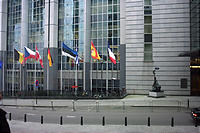
Feel the ever closer union! Raise the Euro! Implement the framework programmes!
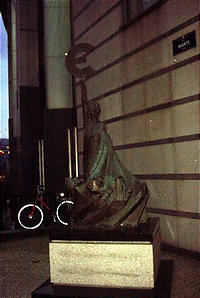
Cute fascism: had this been a bigger sculpture it would have been a modernist-fascist horror. But now it is dwarfed by the mass of the parliament, making it look small and cheeky instead.

Brussels is the only city on the planet that would use a (very dry and bureaucratic) endosement from Jacques Delors as an advertisement for itself.
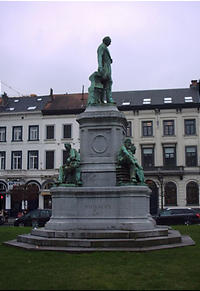
There is a statue of Jean-Victor Poncelet on Place Luxembourg. Nice to see that someone promotes intelligence in the town.

New buildings just west of the Commission building.

Sculpture near Place Jourdan. Note the elegant combination of natural materials, trash, pollution and moss making the viewer ask himself the essential question: did the artist plan on it looking that decayed, or is it just decayed?
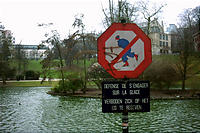
No skating in Park Leopold. Good to know.

Entrance to the Musée des Sciences Naturelles. Feel the power of SCIENCE!!!
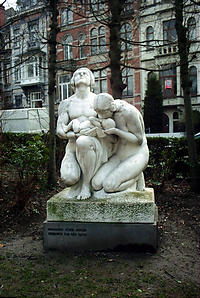
"Who dropped THAT?" Birth of a nation, in a park just nort of Rue de la Loi.

A demonstration that not just Brussels has corporate art. This one is located in my office building in Oxford. It represents time and history, but I guess that is obvious.
February 22, 2006
Fear the Uberlurkare
 Great! I'm part of a conspiracy again! This time it is the Dagens Nyheter newspaper that fearlessly uncovers the sinister mailing list Elit. Just imagine: people gossiping, using rude language and behaving clannishly - and several of them are famous! It is actually rather fun reading, since it so well reveals the reporter's lack of internet savvy (he doesn't know what a lurker is) and inability to decode irony. A well maintained Internet community becomes a sect, where members apparently live in some sorts of BDSM relationship to the list maintainer.
Great! I'm part of a conspiracy again! This time it is the Dagens Nyheter newspaper that fearlessly uncovers the sinister mailing list Elit. Just imagine: people gossiping, using rude language and behaving clannishly - and several of them are famous! It is actually rather fun reading, since it so well reveals the reporter's lack of internet savvy (he doesn't know what a lurker is) and inability to decode irony. A well maintained Internet community becomes a sect, where members apparently live in some sorts of BDSM relationship to the list maintainer.
But the story also has a more sinister side. The mailing list is private and seeks to remain so - leaks inhibit gossiping, and mom is probably more feared than the CIA when it comes to reading internet posts. But the journalist managed a scoop: using a leak he got hold of an archive and mined it for every juicy detail. No doubt he will defend himself that having some fairly famous members there might be a popular interest in knowing who they slander. But does that imply that the presence of even a B-list celebrity in a forum removes privacy protection? People have a right to be rude, egocentric and talk about dirty subjects - it might not be pretty or virtuous, but it is part of life. The article breathes a puritan indignation that somewhere out there people are having dirty fun. There is a righteous air that people should be polite, decent and not network too wildly - or else shut up. A view that is of course entirely contrary to an open society.
This story will no doubt expand a bit, since it also cost one mailing list member her job at Dagens Nyheter. Her membership on the mailing list was enough for the editor to sack her - despite this being a part of her leisure activities, not using company resources. That decision was probably the most stupid thing the newspaper could have done, since it made the news spread like wildfire through journalist and media websites in Sweden. Regardless of the reasons of the sacking - and from the evidence I have seen they do not appear to be strong - this kind of behavior against a journalist tends to get other journalists interested.
News about bloggers being mistreated still occur from time to time. But making mailing list membership a sackable offence in 2006 shows that at least some organisations are several years behind their time - and do not understand the dynamics of news in the Internet age.
[The image is a graphical representation of the number of mailing list posts each day over the last month. Note the intense activity over the last two days as response to the attack. ]
February 21, 2006
Hey Michi
 My friend Michael Johansson has a nice blog if you like math and recipes in Swedish. I think it is characteristic that he uses the Borsuk-Ulam theorem to prove that there are two antipodal points on Earth with the same temperature. It reminds me that the Brouwer fixed point theorem shows that there is one point on Earth where the air moves exactly vertically.
My friend Michael Johansson has a nice blog if you like math and recipes in Swedish. I think it is characteristic that he uses the Borsuk-Ulam theorem to prove that there are two antipodal points on Earth with the same temperature. It reminds me that the Brouwer fixed point theorem shows that there is one point on Earth where the air moves exactly vertically.
February 12, 2006
May I?
Just a little legal game based on the intellectual property rules I learned about during Riksutställningar's seminar Får jag lov? (where I did a bit of lecturing).
One of these two images is illegal, the other entirely legal. They are both indistinguishable.


The rights of the original image is owned by a major litigious company. Downsampling it any amount still doesn't change the rights situation, not even when it is downsampled to one pixel (I then scaled up that one pixel file to make it more visible). It is still produced in an illegal way. The other image was made independently, inspired by the first one but not based on it.
One might consider this a case of IP law being ridiculous, but it is not entirely off-base here. Two identical apples may have different ownership without any physical distinction. I might acquire one legally from you and steal the other - their legal status is independent from their physical status. It is not unlike Nozik's theory of property, where one of the apples (or images) have come into my possession in an improper manner.
If one believes legal status is somehow "real", then it might be the only way we humans can touch the aetheric realms. Just look at the image below:

here individual pixels are either copies of the legal or illegal image, forming a pattern a legal superbeing might be able to see with its "jurovision".
Unless one is a hardline natural law theorist I guess one will settle for a socially constructed theory of property. As one representative from Bildkonst Upphovsrätt i Sverige put it, to have a copyright infringement you need an angry copyright owner. There is an enormous amount of formal infringement going on that would not upset anybody. There is also a lot of activity that is in a broad borderline. Collage art is for example mostly done illegally, since the copyright owners of the component pieces are usually not even contacted. Yet it would seem rather absurd to arrest kindergarten teachers for inciting massive copyright infringement by making their kids do collages.
If I learned one thing during the seminars it is the chilling effects rules have on people. Even knowing that one is probably OK, but formally acting against the law, reduces the will to play. Organisations such as museums are more vulnerable since they are plausible litigation targets and often in a fairly weak situation - controlled by conflict adverse muncipal or state organisations and small budgets. So much easier just to avoid that little creative thing that might get somebody upset, even if it leaves the exhibition a bit more boring.
The problem with the IP debate is that it brings IP to the foreground and hence chills creativity. The ones that get away with it are the one's who doesn't care and doesn't have anything to lose. But that might lead to a situation where our culture's greatest creative expressions and ideas forever are kept outside the market or wider application.
February 11, 2006
Better Humans?
I had the chance to attend the release party of Demos' report Better Humans? The politics of human enhancement and life extension this wednesday.
The collection of essays is a good one. Not necessarily because the individual essays are all brilliant (the quality varies) but because it clearly states that these issues is becoming important, that now is the time to really think about the social implications and brings the weight of Demos and the Wellcome trust to indicate this.
February 01, 2006
Be Less Evil
Recently, Google has been under fire for agreeing with the Chinese government to censor certain searches (see above for a comparision). Possibly a reasonable business practice but still a bad thing for the "don't be evil" company. My friend Phil sent me this excellent little proposal:
-
2 days ago, Google activated a network of Google servers in China. To
do this, they agreed with the Chinese government to censor certain
search terms and web pages on subjects such as Falung Gong, democracy,
human rights, and all major non-Chinese news sources.
Every other web search company working in China - MSN and Yahoo - already did this in order to get into China. Yahoo even gave the Chinese government the name of an activist using a Yahoo email account, as a direct result of which he is now serving a 10-year prison sentence (according to the
Google has the right to act as other companies do. This isn't a question of rights. We thought Google was different. We trusted them. We believed them when they said their motto was "Don't be evil".
We shouldn't boycott Google, because it isn't fair to hold them up to a standard that we hold no one else up to. But we can remind them of their own high standard.
A recent Wired magazine article said that inside Google headquarters is a screen that shows search terms being entered into Google around the world. I would like everyone, every time you use Google, to first type in the search term "don't be evil" and do a search on that. You will be sending a message directly to Google.
If you will, forward this to any friends you have who will forgive you for a little well-intentioned spam. :)
- Phil Goetz
While I dislike self-propagating memes this one actually seems pretty benign, and might provide a bit of subliminal hints to the Google employees.
This also ties in with the interesting talk by David Rodin on corporate social responsibility I attended this tuesday. His paper showed how the shareholder theory (companies only have moral obligations to their shareholder) and stakeholder theory (companies must serve the interests of a broad range of groups, roughly everybody they influence) end up undermining themselves because they lead to a view of companies abstracted from the real businesses (it becomes a "transcendental 'I' of acquisition".
I think the same discussion can be applied to any organisation, both NGOs (does Greenpeace owe moral obligations to the oil companies?) and states. If one takes the stakeholder perspective then Google should do whatever is most profitable. In the stakeholder case, it should balance the interests of Chinese people and Chinese government. But if one accepts the stakeholder model, then the Chinese government is in a deep sense already representing the Chinese people (in the shareholder view it is also presumably also representing them or a certain minority). Hence Google would need only to take into account what the Government wants. Claiming that the Chinese government is not acting as a good representative of stakeholder interests places the burden of judging and balancing these interests in the hands of Google - now the poor company should also act as a kind of forum of Chinese society! I wouldn't mind seeing such things happen - interference in the internal politics of a society can also be social responsibility - but it is hardly morally obligatory.
Rodin's approach to construct a more tangible corporation as the moral subject seems reasonable and leads to a bit more common-sense in this respect. Google will still have to make a problematic decision, and we can indeed discuss whether the Chinese government lives up to government social responsibility. But a company that actually has a internal motto with some ethical meaning (however soft) might take well to being reminded of not being evil.
Operant Conditioning Oxford
 This week's CNE blog is about how I got threatened by animal activists, or rather, how everybody in Oxford got threatened. The militant British animal rights movement has managed to become terrorists in a strict sense of the word - the use of threats of violence to achieve political or religious goals. In the end, I think this approach is self-defeating because it both alienates democratic society (which foots the bills of the attacked research and controls the legal system) as well as the less militant parts of the animal rights movement (who now have to spend much time distancing themselves from the terrorists rather than argue their main point). But in the meantime it can do much damage.
This week's CNE blog is about how I got threatened by animal activists, or rather, how everybody in Oxford got threatened. The militant British animal rights movement has managed to become terrorists in a strict sense of the word - the use of threats of violence to achieve political or religious goals. In the end, I think this approach is self-defeating because it both alienates democratic society (which foots the bills of the attacked research and controls the legal system) as well as the less militant parts of the animal rights movement (who now have to spend much time distancing themselves from the terrorists rather than argue their main point). But in the meantime it can do much damage.
Terrorists seem to try to implement a reinforcement schedule: as long as certain actions are not done, punishment occurs. It is a variable ratio schedule, which is fairly effective (if one knew that there would be one terrorist attack each month or per opposed project, it would be less frightening). The Oxford terrorists are now subjecting a significantly larger number of mammals to an unpleasant experiment than would plausibly be used in any laboratory.
